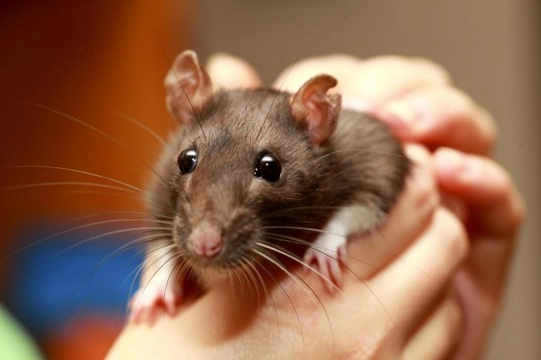
Reasons Why Pet Rats Sometimes Bite: Causes and Solutions
If you're new to handling pet rats, one of the common questions is whether they will bite. While wild rats may bite frequently due to fear and survival instincts, pet rats generally rarely bite if they are handled with care and understanding. Pet rats for sale have been selectively bred over time to be gentle and passive towards humans but they can still bite if provoked or threatened.
Understanding your rat’s behaviour and body language is essential to foster trust and minimise the chance of bites. Usually, if a rat bites, there is a cause or warning signs beforehand. Here are the common reasons why a pet rat may bite and ways to address them responsibly:
1. Fear
Fear is the most common cause of biting in pet rats. Rats are prey animals and will bite as a defence when frightened or feeling threatened. Rats that have been mistreated or traumatised, particularly adult rats newly introduced to a home, may need gentle and patient handling to build trust over time. If your rat tries to escape, squirms, or squeaks when picked up, it’s showing signs of fear. Forcing interaction can increase the likelihood of a bite. Allow short, calm handling sessions and use positive reinforcement to make interactions rewarding.
2. Pain or Illness
A rat in pain may bite suddenly and out of character. Handling accidents such as trapping a tail or dropping the rat can cause immediate pain. Additionally, underlying health issues might cause irritability and defensive biting. If your rat bites unexpectedly and shows other signs such as lethargy or changes in appetite, it's wise to consult a a vet experienced with small mammals to rule out medical problems.
3. Elevated Hormones and Social Hierarchy
Adult male rats, especially those under one year, can exhibit hormonal aggression as they establish dominance within their group. This may include charging or biting, sometimes directed at humans. It’s important to assert calm and confident control to reinforce your position as the caretaker while ensuring the rat has social contact with compatible companions to satisfy its social needs.
4. Pregnancy and Maternal Protection
Pregnant or nursing female rats become highly protective and territorial around their nest. They may bite if disturbed. To prevent stress and biting, avoid handling females when pregnant or caring for young pups, and limit disturbances to their nesting areas during this sensitive period.
5. Redirected Aggression
If rats are fighting, they may bite anything nearby, including your hand, out of redirected aggression. Never put your fingers between fighting rats. To safely separate them, use a thick cloth or spray water from a distance. Remember, biting in this situation is a defensive reaction to the fight, not a personal attack.
6. Biting Through Cage Bars
Rats may nibble on fingers poking through cage bars, especially if they associate fingers with food treats. This behaviour is generally not aggressive but accidental. To avoid this, never put your fingers through the bars. Teach children in the household the same rule to prevent accidental bites.
7. Being Startled or Surprised
Rats do not appreciate being suddenly grabbed or woken up; this often leads to bites. Always approach a rat’s cage calmly, talk softly, and let them know you are there before handling. When cleaning the cage, move rats gently away from nesting areas and introduce them slowly back to fresh bedding to reduce stress and the chance of biting.
8. Lack of Socialisation or Previous Trauma
Rats that have had limited socialisation or have been mistreated may bite more often. These rats require patient, gentle handling to build confidence and trust. Investing time in positive interactions enhances their comfort with humans and reduces biting risk.
Summary
Pet rats are affectionate, intelligent, and gentle companions when handled appropriately. They rarely bite without reason and usually give warning signals before doing so. By learning to interpret their behaviour, respecting their boundaries, and maintaining good health and social conditions, you can enjoy a rewarding relationship without fear of bites. Remember, patience and respect are key to happy and safe interactions with your pet rat.



